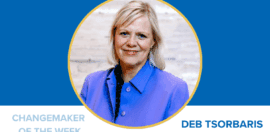Steering Social Change Organisations Through Growth and Change

7 February 2025 at 9:00 am
Elise Sernik, CEO of Leadership Space is an organisational coach and facilitator with a long history of specialising in the social purpose sector. She founded Leadership Space over a decade ago, to help social purpose leaders and teams to steer their organisations through growth and change.
Elise’s career spans the commercial sector, leadership roles in the social purpose sector in Australia and the United Kingdom, and extensive strategy consulting both for commercial organisations and with Social Ventures Australia. Elise is this weeks Pro Bono Australia Change Maker.
Describe your career trajectory and how you got to your current position?
Like most 20-year-olds, I started out with very little idea of what I wanted to do. I began in sales, then progressed into business development, being promoted at BBC Worldwide into a fabulous role where I was negotiating the sale of news and current affairs programming across the Asia Pacific.
In 2000 I moved back to London, my birth town and switched into strategy consulting to the media industry. A couple of years later, amidst the IT crash, I found myself unemployed and reevaluating my career. It was at that point that I made the intentional move into the social purpose sector. I joined the large asthma charity, Asthma UK, leading various parts of the fundraising and marketing functions, eventually heading up the team.
I moved back to Australia in 2005 and, after noisily expressing my discomfort at the state of the sector in Australia took up the role of General Manager of Nonprofit Australia, an organisation set up to lift the efficiency and effectiveness of the sector. This led after some time to an incredible period with their innovative and fast-growing sister organisation, venture incubator Social Ventures Australia (SVA). It was around this time I entered a new phase of study and practice as I did one diploma after another in fields related to adult development.
Then, in 2011 as I was on maternity leave, a serendipitous call to an SVA colleague led to full time coaching and leadership development as part of People for Purpose, which after 18 months became my own independent social purpose business, Leadership Space.
Take us through a typical day of work for you.
My days typically see me moving between two key modes. The first is my role as leader of our highly experienced and skilled Leadership Space team. As the anchor for this team, I act as peer mentor for my fellow coach-facilitators, approver of major proposals, team facilitator of our own strategy, and the head of business development and marketing: defining our direction, building partnerships with other capacity building organisations, capturing our insights in articles and case studies.
The second is as organisational coach myself. Organisational coaching involves a rich combination of moving between individual sessions – coaching executives at CEO level, board or executive; problem solving complex issues around structure, strategy, team functioning and board performance with clients; and facilitating both team development and collective problem solving with executives and Boards.
Part of what suits me so well about this mix is that it meets my need for quiet introverted thinking time, deep individual conversations, and the more extroverted context of large groups.
What is the biggest challenge you’ve encountered in your career, and how did you overcome it?
Running your own business requires a kind of deep resilience and persistence that I’ve thrived with but at times has been very intense. One of the trickier times was when COVID hit. Like everyone else, being at home with both kids was hard, compounded by having a husband who ran a face-to-face business, and managing a renovation at the same time.
From a professional perspective, what I quickly realised however was that because we’d always been a remote-first business we were not only immune from some of the biggest shocks, but that we also had practical first-hand experience that we could leverage for our clients. Overcoming the challenges of moving fully online for our clients however took grit and creativity, particularly around technology. I think the most helpful practices here were lots of active research and quick fail-fast experimentation.
If you could go back in time, what piece of advice would you give yourself as you first embarked on your career?
Trust that everything you’re doing will be valuable one day in ways you can’t even guess at now. These are not random choices; they are an exploration of the territory that will ultimately become all of who you are and what you are capable of. Listen deeply when people offer you insights about what you bring that is unique.
It’s a real asset to be willing to start doing something before you’re great at it. Accept that imposter syndrome is part of life and learning. Growth through experience is courageous, interesting and one of the very best teachers.
How do you unwind after work?
I have loved having a puppy the last couple of years. Every evening her and I walk to the park along the harbour, I gaze at the water, chat to the eclectic local community, and absorb the simple pleasure of happy puppies chasing each other across the grass.







